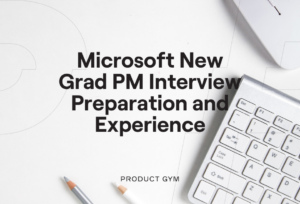For prospective Product Managers, trying to come up with how to answer “why are you leaving your current job” in a Product Manager interview can seem intimidating. Recent job changes, long-term history at the same company, or even a situation where there are gaps in your work history can make this question seem tricky to nail. But it doesn’t have to be complicated! No matter the scenario, with a little preparation this question is no reason to stress.
What Are Interviewers Looking For?
The “why are you leaving your current job” question is a staple of interviews no matter what field, and it usually comes up in first-round interviews in the first 3-5 questions you are asked. It is an ideal opportunity to set the tone for the rest of your interview: when asking your reason for leaving your current job, recruiters are obviously trying to get a handle on your situation and motivating factors.
However, potential employers may also be looking for certain cues or red flags depending on what your resume looks like. Understanding what angle to take and what to avoid will vary based on the details of your scenario and work history. With that in mind, there are a couple of guidelines that may help navigate coming up with your own answer.
How to Impress with Your Answer
A powerful way to make sure you stand out from the start is to preempt the interviewer’s questions by asking a question of your own. Thank whoever is conducting your interview for scheduling you, and make your enthusiasm for the opportunity clear. Once the tone is set, come right out and ask the recruiter what it was about your background that prompted them to call you.
This can be an incredibly powerful way to start off and a very useful piece of information for you going forward with the interview. Knowing why they picked you specifically can help you understand what value you bring to the table for them, and can therefore inform what strengths to highlight in the interview process.
With that in mind, before considering specific scenarios, there is a common denominator that should apply to all successful answers. When explaining why you are leaving your current job — regardless of what your situation actually is — the goal is always to make you look like you are selectively applying to this particular company and this particular opportunity.
Companies do not want to hire someone that is bringing negativity into their work. Creating the impression that you are just desperately trying to leave your current situation will be a big red flag for recruiters. Even if it’s justified, companies aren’t as likely to be interested in somebody who is just mass applying to every job they can.
How to Answer “Why Are You Leaving Your Current Job”: 3 Scenarios
Instead, you want to shift the focus away from what isn’t working at your current company and towards what is compelling you to this prospective one. Before the interview, do your research: search the company in google news, and check out their social media. In this era where every company has an online presence, it shouldn’t be difficult to find three to five things happening with the company that you can identify as legitimate reasons why you’re excited about this position. Maybe they recently secured funding, or announced plans to expand into a new market. Whatever it is, the goal is to find specific things you can cite that interest you.
1. When You Haven’t Been at Your Current Job for Very Long
This especially applies to any scenario where you are leaving a job that you haven’t been at for very long. Even coming from the most toxic work environment, you can avoid the negativity. When asked why you want to leave your current job, you can identify that while you are content, you are a close follower or a fan of the company and were excited to hear about their plans for expansion in to a certain market or to break in to a new product line, or whatever your specific reasons are.
By doing this, you are changing the conversation from you applying because you are coming in from a bad work environment and need a job, to one of hope and enthusiasm, demonstrating your understanding of the company mission. This perspective not only brings better value for the company, but helps you stand out as well prepared and thoughtful.
2. When You’ve Stayed in Your Current Role Too Long
This strategy is also very effective in a scenario where you have been at your current company for a very long time. Identify to the recruiter that you are actually very happy at your current company and did not have plans to leave before you saw the opportunity open up and decided to polish up your resume and give it a shot. Circle back to your research and the specific reasons you are excited about the company.
Now, instead of coming across as a Product Manager who has been stagnant for too long, you are a genuine fan that believes in what the company is all about. We’re shifting the narrative from ‘you need a job’ to ‘you feel like you can add value to their mission.’
3. When You Have Gaps in Your Resume
Even if you have gaps in your resume, keeping the focus on your strengths and value to the company as a Product Manager is always a winning hand. Never make a big deal out of gaps in work history. The less you make it a problem, the less recruiters will treat it like a problem. The more nervous you are, the more likely you are to seem like you are someone with something to hide.
Remember: recruiters are very busy people! They don’t have time to waste talking to candidates they would not hire, and therefore wouldn’t have scheduled an interview with you if you didn’t have a chance at the position.
Ace Every Product Manager Interview Question
It’s easy to get intimidated during the interview process, but no matter what issues or quirks you perceive in your work history, the interviewer read your resume and saw something in your background that has gotten you in the room.
Your first hurdle has been cleared just by getting to this point, and now all that is left is to stand out from the other candidates. That said, if you are struggling to get interviews and are concerned about your branding or work history may be coming across, schedule a free 30 minute call with one of our senior advisors and let them have a look at what you have. We’d love to hear from you.




